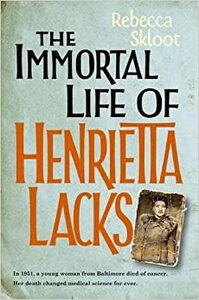Take a photo of a barcode or cover
challenging
informative
medium-paced
informative
medium-paced
challenging
emotional
hopeful
informative
reflective
sad
medium-paced
Went to a talk with Rebecca Skloot and history and chemsitry professors giving context. So excited to actually read the book...what a phenomenal (and heartbreaking) story, and sad that no one has thought to tell it until now.
A few weeks ago Matt and I were driving to North Carolina and I was having a bit of a meltdown about how not one single thing in our country is okay and everything is terrible and all the things are interconnected so how on earth are we going to be able to sort out this giant mess.
Matt said, you can't think of a single thing that we're doing well here? I said I was having a hard time thinking of anything, and he said, well, we've made great strides in cancer research, it's not always a death sentence anymore.
I agreed with him, but mostly to get him to stop talking. Because yes, I know it's not always a death sentence, but it seems like most of the treatments are still fairly terrible and also ... I don't know any scientists, most of the people I'm around regularly are engineers of various spots, and so how many people could actually be scientists doing cancer research, it couldn't possibly be that many.
Matt and I were having a coffee date yesterday, and I was reading this book, and at one point I looked up at him and said, remember that conversation about cancer research? I didn't believe you, that this was as big an industry as it is, that scientists worldwide are working on this. And he was like, uh yeah this is a multi-billion dollar industry! And I'm like yeah yeah I didn't believe you knew what you were talking about, but I do now.
Of course, there are lots of ethical problems with how we've made those strides... and I'm going to be thinking about that for a while. I'm glad Skloot also included stories of other people trying to sue for their tissue rights, and about the complicated ethics of tissue storage from normal people. The legal issues were fascinating.
This book taught me a lot of things about a lot of things I didn't know, and I'm glad I read it. Skloot wrote in a straightforward and engaging manner that helped me to understand subjects I had never heard of before, and helped me to not mix up a huge cast of characters. An excellent book.
Matt said, you can't think of a single thing that we're doing well here? I said I was having a hard time thinking of anything, and he said, well, we've made great strides in cancer research, it's not always a death sentence anymore.
I agreed with him, but mostly to get him to stop talking. Because yes, I know it's not always a death sentence, but it seems like most of the treatments are still fairly terrible and also ... I don't know any scientists, most of the people I'm around regularly are engineers of various spots, and so how many people could actually be scientists doing cancer research, it couldn't possibly be that many.
Matt and I were having a coffee date yesterday, and I was reading this book, and at one point I looked up at him and said, remember that conversation about cancer research? I didn't believe you, that this was as big an industry as it is, that scientists worldwide are working on this. And he was like, uh yeah this is a multi-billion dollar industry! And I'm like yeah yeah I didn't believe you knew what you were talking about, but I do now.
Of course, there are lots of ethical problems with how we've made those strides... and I'm going to be thinking about that for a while. I'm glad Skloot also included stories of other people trying to sue for their tissue rights, and about the complicated ethics of tissue storage from normal people. The legal issues were fascinating.
This book taught me a lot of things about a lot of things I didn't know, and I'm glad I read it. Skloot wrote in a straightforward and engaging manner that helped me to understand subjects I had never heard of before, and helped me to not mix up a huge cast of characters. An excellent book.
Another great read about a woman who changed the world, but has not received the respect in doing so. I am not a science guru, but I still enjoyed reading about Henrietta Lacks because her story is more than a book about how she contributed to the development in science and medicine. This is a story about a young woman's life and how her life placed her and her family in their current state. I definitely recommend to anyone who enjoys reading a good biographical storyline.
Before reading this book, I only had a vague idea about Henrietta Lacks and the science surrounding her cells. While scientists have used her cells in a variety of research, very little was known about the woman herself. Through this story, Henrietta Lacks and her family were humanized, especially, Deborah, who was "the soul of this book". Moreover, the author helped me gain an understanding about the scientific process and ethics surrounding the HeLa cells by summarizing the science of cell culture, other similar cases and the debates surrounding tissue ownership. The timeline was at times confusing because the author jumps from the past to the present, but it did not detract from my reading experience.
Overall, an interesting and captivating read.
Overall, an interesting and captivating read.
Wow - what an unexpected awesome book. I wasn't sure what I was getting myself into when I decided to read this. I really enjoyed how Ms. Skloot balanced both the complex history and science of the HE-LA cells with the intriguing and real human drama the family experienced. I was fortunate to recently talk about this book with a few public health student who shared how much they loved the book and how much its influenced their decision to work in field.
Here's a powerful quote from the author of "Night" included in the work:
“We must not see any person as an abstraction. Instead, we must see in every person a universe with its own secrets, with its own treasures, with its own sources of anguish, and with some measure of triumph. —ELIE WIESEL from The Nazi Doctors and the Nuremberg Code”
Here's another one comes from Henrietta's daughter, Deborah: “if you gonna go into history, you can’t do it with a hate attitude. You got to remember, times was different.”
I highly recommend you read this.
V
Here's a powerful quote from the author of "Night" included in the work:
“We must not see any person as an abstraction. Instead, we must see in every person a universe with its own secrets, with its own treasures, with its own sources of anguish, and with some measure of triumph. —ELIE WIESEL from The Nazi Doctors and the Nuremberg Code”
Here's another one comes from Henrietta's daughter, Deborah: “if you gonna go into history, you can’t do it with a hate attitude. You got to remember, times was different.”
I highly recommend you read this.
V
hopeful
informative
inspiring
sad
medium-paced
I love the story, but sometimes this book dragged a little bit for me. The storytelling was generally really good though, and it’s such an important and necessary story to tell.




